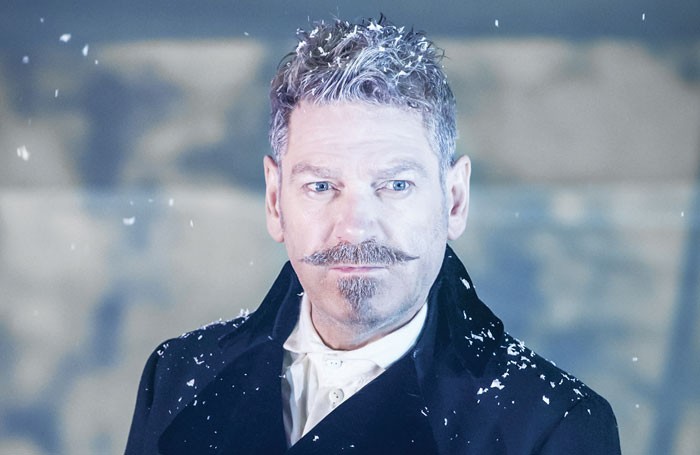
Photo: Johann Persson
The set is decked out in Christmas colours. Wine red and fir green. There’s a prettily decorated tree and a dusting of something snow-like falls from above. You can almost smell the sherry and cloves – it would not be at all surprising if Michael Caine strode in from the wings with Rizzo the rat in hot pursuit.
Kenneth Branagh’s starry West End season begins with The Winter’s Tale and the winter it has chosen to situate us in is one of Charles Dickens diluted with John Lewis. Christopher Oram’s set is certainly handsome and easy on the eye, appearing at first like a velvet-bedecked extension of the theatre itself while also faintly bringing to mind the MCU’s take on Asgard – all cinematic mist and imposing pillars – with a dash of 1970s curry-house thrown in for good measure (at least from where I was sitting those pillars appear to be covered in burgundy flock wallpaper).
As well as co-directing, along with Rob Ashford, Branagh stars as Leontes, the king whose swelling jealousy at his wife’s relationship with his childhood friend, Polixenes, leads him to become so crazed with suspicion that he puts her on trial and gives the order that his new-born child be abandoned in a place of desolation. News of their young son’s death soon after, as a direct result of his actions, comes as a body blow; Branagh doubles over as if punched. It should be a wrenching moment, but there’s something very choreographed about his collapse, his orchestrated wailing. Like so much of the acting in this production it’s big and gestural; marker pen acting, drawing fat lines under the text. There’s quite a lot of groin business and trouser thrusting too, to make sure those at the back don’t miss out on the innuendos.
The Winter’s Tale is a difficult beast and one Branagh hasn’t quite managed to tame. The plot either rockets along – death, exile, bears (!) – or stretches out lazily like a broken accordion. The Bohemia scenes, as staged here, are pretty tedious; sixteen years on and Leontes’ daughter Perdita is living amiably among a bunch of loveable rustics, which mainly results in singing – so very much singing. It’s a relief to get back to Sicily, which (not unfittingly) has become a kind of Narnia: the world snow-globed, white-witched, dusted with powdered sugar. There’s a tenderness and melancholy to these final scenes – in which Hermione is released from her stone prison, looking rightfully disorientated. Branagh’s Leontes seems worn down, hair-silvered, regret etched on his face. But none of this quite counterbalances the excess, the front-and centreness, the sheer bigness, of some of the earlier scenes, the mugging and Nunn-ing. There are a lot of skilled people on stage but all too often they appear to be playing up to the Garrick’s recently re-gilded ceiling. (It’s a good thing there’s no Turkish delight about or that too would definitely get eaten).
It’s the three women who end up grounding the production and who (mostly) avoid falling down this hole. Jessie Buckley makes a sweet Perdita and Miranda Raison’s is a sympathetic Hermione. Judi Dench as both Paulina, Hermione’s loyal friend, and as the figure of time, is twinkly yet also impish – there’s something sharper and stranger about her than is initially apparent. She’s not on stage all that much but when she is she invests her role with a subtlety and clarity of emotion.
Branagh has chosen to follow The Winter’s Tale with Harlequinade, Terence Rattigan’s 1948 one-act play written in part as a response to the playwright’s experience of working with theatre power couple of the time, Alfred Lunt and Lynne Fontanne, who torpedoed his 1944 play, Love in Idleness.
Described as a ‘soufflé’, it is indeed a feather-light thing, a comedy of thespian ego and excess with a somewhat floppy plot about an estranged daughter. It’s entirely possible to see why Branagh wanted to stage it: the plays it references most are Romeo and Juliet and The Winter’s Tale, which both form part of his season and as an infrequently performed Rattigan play – it’s accompanied by the even less well known All On Her Own, a short, taut monologue about bereavement written in 1968 for television and performed here by Zoe Wanamaker – there’s the curiosity factor too. And it’s a solid enough comedy on its own terms, even if some of the jokes are on the gossamer side. It contains some interesting references to CEMA and the origins of the Arts Council, and a pleasing performance from Tom Bateman as an exasperated stage manager, but the biggest laughs come at the expense of actors and their vanities.
In fact the play actively mocks the kind of wide-eyed and wide-armed acting that was so in evidence in the earlier production. It’s genuinely hard to tell how much of this is intentional. There’s definitely a knowingness to the performances and the way the roles are distributed, with Branagh and Raison playing the thespian couple, Arthur Gosport and Edna Selby, and Jessie Buckley playing Arthur’s accidental offspring, his youthful oops.
It’s actually quite a lot of fun and Branagh in particular seems to be enjoying himself as the pompous Gosport, but it almost seems designed to deflate some of the very traits in evidence in his Winter’s Tale and makes for a slightly odd companion piece as a result.

